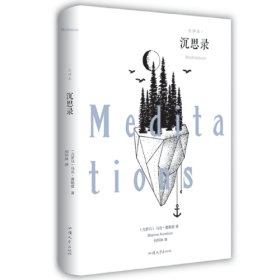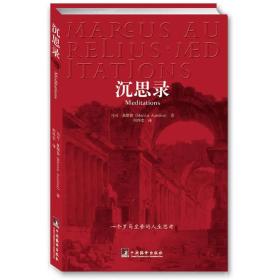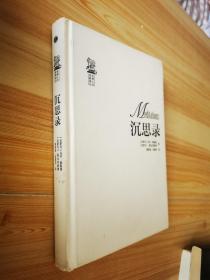
沉思录
全新正版 假一赔十 可开发票
¥ 10.99 5.2折 ¥ 21 全新
库存2件
北京东城
认证卖家担保交易快速发货售后保障
作者(古罗马)玛克斯·奥勒留(Marcus Aurelius) 著;(英)罗宾·哈德(Robin Hard) 英译
出版社译林出版社
ISBN9787544759915
出版时间2016-03
装帧平装
开本16开
定价21元
货号1201268092
上书时间2024-10-08
- 最新上架
商品详情
- 品相描述:全新
- 商品描述
-
作者简介
玛克斯·奥勒留(121-180),古罗马帝国皇帝。为帝国之治夙兴夜寐,为平定兵患而征战四方,并很终死于军中。奥勒留在文学、修辞、哲学、法律、绘画方面均受过良好教育,利用政事辛劳当中的片暇记录与自己的心灵对话,为后世留下不朽的精神财富——《沉思录》。
目录
Introduction
Note on the Text
Select Bibliography
A Chronology of Marcus Aurelius
MEDITATIONS
BOOK 1
BOOK 2
BOOK 3
BOOK 4
BOOK 5
BOOK 6
BOOK 7
BOOK 8
BOOK 9
BOOK 10
BOOK 11
BOOK 12
Appendix: A Selection from the Correspondence
between Marcus Cornelius Fronto and Marcus
Aurelius
Explanatory Notes
List of Letters Translated
Index of Themes
内容摘要
《沉思录》是古罗马帝国皇帝玛斯·奥勒留在鞍马劳顿中所记录的与自己心灵的对话。这位一千八百年前的旷代奇人在书中阐述了灵魂与死亡的关系,解析了个人的德行、个人对社会的责任以及对为人处世律己待人之道等诸多人生哲理的领悟。该书不仅是古罗马斯多亚派哲学的里程碑,而且对今人的思想及生活仍有着重要的指导意义,可以说是人间至宝。
精彩内容
THE Meditations of Marcus Aurelius is a work without parallel among writings surviving from Classical antiquity—and an exceptional work in any age and culture. It is the philosophical diary of a Roman emperor, probably written while he was campaigning in Germany near the end of his life. In short, intense, and often powerful reflections, Marcus tries to articulate his core beliefs and values. Darwing mainly on Stoic philosophy, but formulated in his own way, Marcus finds the resources to help him meet challenges that he is acutely conscious of but which are also universal: facing one’s own approaching death, making sense of one’s so role and projects, looking for maral significance in the natural world.
Marcus’ Life and Career
Marcus (AD 121-80) was born in Rome as Marcus Annius Verus into a family of Spanish origin which had already achieved political distinction, His father died while Marcus was a child, and he was brought up by his grandfather, a relative of the emperor Hadrian, Hadrian admired the young Marcus, calling him Verissimus (‘most truthful’). When Hadrian chose Antoninus Pius as his heir and successor, he made Antoninus adopt as his sons Marcus and another young man, Lucius Verus. Marcus was educated by a number of famous teachers, including the orator Fronto; much of their correspondence survives, and a selection is included in his volume. From the age of 12, Marcus showed a strong interest in philosophy; after an early introduction to Stoicism, Junius Rusticus guided him to Epictetus’ Discourses which formed an important influence on the Meditations (1.7). Marcus married Antoninus’ daughter Faustina, his first cousin, in 145, and seemed to have had a largely happy marriage, with several children. In Book 1 of the Meditations (the only bok which has a single theme and overall structure), Marcus reviews the ethical and intellectual influence of his family and friends, giving spe attention to his adoptive father and predecessor as emperor, Antoninus Pius (1.16).
Marcus’ period as emperor(161-80) was marked by good relations between emperor and senate and was generally seen as a period of good administration. He ruled as co-emperor with Lucius Verus until Lucius’ death from illness in 169, and this collaboration seemed to have worked well. However, this was also a period when the stability of the roman empire was under threat from external enemies, and much of Marcus’ effort was devoted to organizing resistance to these threats. Between 162 and 165, the main focus was on responding to the Parthian invasion of the eastern part of the empire, with Lucius Verus as commander. In 166 and 168, plagues in Italy and the death of Lucius interrupted attempts to stabilize the Danube frontier of the empire. There was a series of campaigns in north Italy and Germany until his death in 180. These campaigns were largely successful and the borders of the empire were secured. A further threat was a failed revolt against Marcus by Avidius Cassius, governor of Egypt and Syria in 175. There were also persecutions of the Christians in Roman Gaul (France) and Asia Minor (Turkey), remembered bitterly in Christian sources but not treated as much of importance in Roman historical records. Despite all these disturbances, Marcus’ period as emperor was regarded as a good one at the time and afterwards, espely by contrast with his son, Commodus (emperor 180-92), who ruled badly and was finally assassinated as a tyrant.
Meditations: Form, Purpose, style
In a sense the Meditations have virtually no literary form and belong to no recognized genre of ancient writing. The title, Meditations was given to the work in the seventeenth century, is not thought to be Marcus’ own. Probably the work had no title and was not intended for publication but served as a purely private notebook for Marcus’ reflections. Ancient Greek and Roman texts are conventionally subdivided into ‘books’ and ‘chapters’; and this arrangement has been applied to this work. But only the first book (which records Marcus’ ethical debts to those who have influenced him) has any clear overall structure, and show little or no sign of deliberate organization. It seems likely that Marcus simply wrote down one or two comments at moments of leisure, for instance, at the beginning or end of the day, and the resulting work is the sum of those comments. The Meditations are written in Greek, which was the standard language for ancient philosophy and which Marcus would have known well (though, of course, his normal language was Latin). There are some indications that the work was written towards the end of his life; two books (2 and 3) have heading which refer to his German campaigns. Frequent and increasing references to his age, dissatisfaction with his associates, and his approaching death may indicate that the order of the books corresponds to the order in which they were written.
In spite of the non-standard character of Mar
相关推荐
— 没有更多了 —






















以下为对购买帮助不大的评价